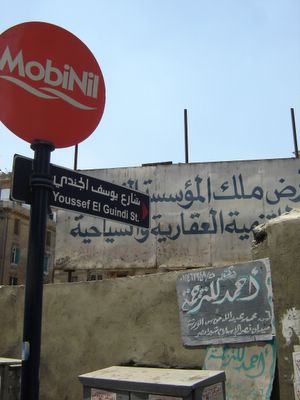Call us the erudite philistines

Eyad snaps the "restored" Heb Sed temple in dispute at Saqqara.
Today we visited Saqqara and Memphis, two well-known sites of Egyptian temples, pyramids and mastabas roughly an hour southwest of Cairo.
The steppe pyramid is the oldest pyramid in the world, and the accompanying mortuary temple across the way houses an astounding collection of original installation hieroglyphic tablets still on the walls and in a very unadulterated setting. Walking into this tomb it appeared more like a one-story office building, but the walls were covered floor to ceiling with hieroglyhics in their natural state.
Since our clan is liable to resorting to the self-proclaimed expertise we have, our trek through Saqqara was blighted by our overtly critical questions and suspicion concerning the primary temple which was repaired and "restored" by a noted French archaeologist, Jean-Philippe Lauer, during the course of the last 74 years until his recent death. The problem was entangled in the fact the collonades and enclosures looked "too perfect" as one of the oldest sites in the world, and we could not delineate the line between what was original and what was restored. Monsieur Lauer appears to have taken archaeological license in his extensive work at Saqqara at which we (collectively with no factual grounding) concluded was granted in the absence of tourists or external intervention for quite some time. Perhaps like when one plagarizes. Except Lauer was plagarizing off his own imagination. The remainder of Saqqara once more was challenging the validity of our guides.
Memphis was relatively lackluster in its sole statue of Ramses II and a few others. Overall, an exciting day, particularly the hieroglyphics in the cool and cavernous rooms at Saqqara.














